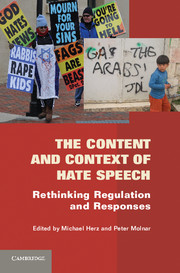Book contents
- Frontmatter
- Contents
- Contributors
- Foreword: Hate Speech and the Coming Death of the International Standard before It Was Born (Complaints of a Watchdog)
- Foreword: Hate Speech and Common Sense
- Acknowledgments
- Introduction
- Part I Overviews
- Part II Refinements and Distinctions
- 7 Social Epistemology, Holocaust Denial, and the Post-Millian Calculus
- 8 Denying Experience
- 9 What's Wrong with Defamation of Religion?
- 10 Responding to “Hate Speech” with Art, Education, and the Imminent Danger Test
- 11 Reconceptualizing Counterspeech in Hate Speech Policy (with a Focus on Australia)
- 12 Hate Speech and Self-Restraint
- 13 Hate Speech in Constitutional Jurisprudence
- 14 One Step Beyond Hate Speech
- 15 Hate Speech and Comprehensive Forms of Life
- Part III Equality and Fear
- Part IV International Law
- Index
- References
11 - Reconceptualizing Counterspeech in Hate Speech Policy (with a Focus on Australia)
Published online by Cambridge University Press: 05 June 2012
- Frontmatter
- Contents
- Contributors
- Foreword: Hate Speech and the Coming Death of the International Standard before It Was Born (Complaints of a Watchdog)
- Foreword: Hate Speech and Common Sense
- Acknowledgments
- Introduction
- Part I Overviews
- Part II Refinements and Distinctions
- 7 Social Epistemology, Holocaust Denial, and the Post-Millian Calculus
- 8 Denying Experience
- 9 What's Wrong with Defamation of Religion?
- 10 Responding to “Hate Speech” with Art, Education, and the Imminent Danger Test
- 11 Reconceptualizing Counterspeech in Hate Speech Policy (with a Focus on Australia)
- 12 Hate Speech and Self-Restraint
- 13 Hate Speech in Constitutional Jurisprudence
- 14 One Step Beyond Hate Speech
- 15 Hate Speech and Comprehensive Forms of Life
- Part III Equality and Fear
- Part IV International Law
- Index
- References
Summary
There is an aspect of the hate speech debate that tends to rest on common, yet unstated, assumptions, and that has profound implications for the progress of the debate and for the perceived dichotomous relationship between responding to the problem of hate speech and protecting freedom of expression. The “free speech versus hate speech” debate is infused by a conception of counterspeech that is, I will argue, unnecessarily narrow. Further, it is one that contributes to an unhelpful and ultimately futile polarization of positions with regard to what states, or governments, or communities ought to do in response to the problem of hate speech.
I will outline the nature and the implications of this shared conception for the hate speech debate both at a policy and a theoretical level. I will then present an argument for an alternative conception. This alternative is based on a reconceptualization of counterspeech located within Martha Nussbaum's capabilities theory, and it has significant implications for ideas about an appropriate response to speech that is perceived as harmful. I will make a seven-step argument for a new type of policy, one that is able to overcome the difficulties of the often unrecognized, but shared, dominant assumptions about counterspeech in the current debate.
- Type
- Chapter
- Information
- The Content and Context of Hate SpeechRethinking Regulation and Responses, pp. 198 - 216Publisher: Cambridge University PressPrint publication year: 2012
References
- 16
- Cited by



